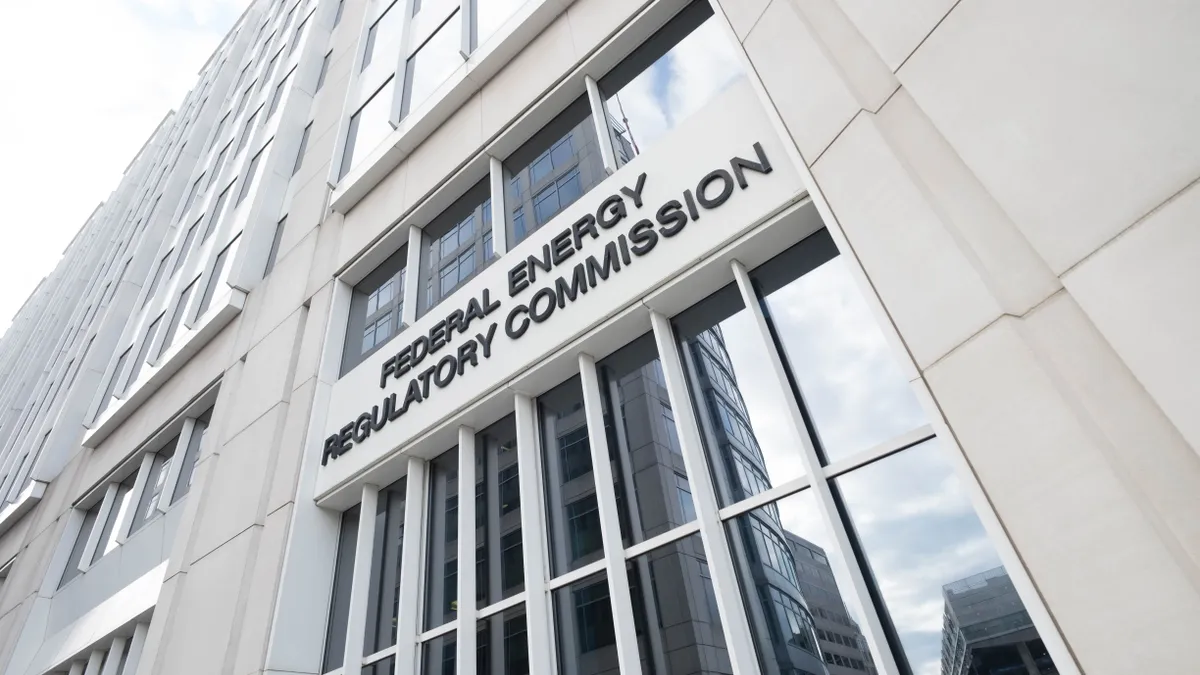UPDATE: July 1, 2020: The District of Columbia Circuit Court of Appeals ruled 10-1 on Tuesday that the Federal Energy Regulatory Commission lacks authority to postpone rehearing decisions on natural gas projects through the issuance of tolling orders. The practice has delayed parties that oppose FERC rulings from challenging those decisions in court.
FERC Commissioner Richard Glick called the decision a "resounding victory" for landowners impacted by FERC's pipeline orders. "It is important that these parties can go to court before a company can take their land & build a pipeline affecting their communities," he said in a tweet.
"Given the DC Circuit’s opinion FERC will likely stop issuing 'tolling orders,' not just in natural gas pipeline proceedings, but electric proceedings as well," Steve Weiler, a partner at Dorsey & Whitney, said in a statement. Language for the tolling orders under the Natural Gas Act is similar to the Federal Power Act.
Dive Brief:
- The U.S. Court of Appeals for the D.C. Circuit held an en banc hearing on Monday to examine federal energy regulators' use of tolling orders, particularly regarding the approval of the Atlantic Sunrise Pipeline.
- All 11 judges analyzed a section of law that empowers the Federal Energy Regulatory Commission to indefinitely postpone litigation of its orders under the Natural Gas Act (NGA). An en banc hearing is rare in the D.C. Circuit, and indicates a majority of the court wants to take a second look at something inherently complex, according to Gillian Giannetti, an attorney with the Natural Resources Defense Council. NRDC submitted a friend-of-the-court brief to participate in Allegheny Defense Project v. FERC.
- The case revolves around the NGA and whether some parties are blocked from taking action on an order, like challenging it in court, while allowing construction of the contested project to be carried out. Proponents of tolling, including several pipeline developers that acted as intervenors on the case, say the practice gives FERC sufficient time to respond to complex rehearing requests.
Dive Insight:
Tolling orders are an accessible tool for FERC to delay judgement on rehearing requests when more time is needed to consider arguments regarding the legality of the commission's actions. FERC attorney Robert Kennedy said tolling orders are "generally entered almost as a matter of routine."
Petitioners argued that pipeline projects have been completed while opponents were unable to litigate because a tolling order was in place.
"This case is exceptionally important because it brings to light a habitual practice by [FERC] that raises serious questions of fairness, due process and legality. And the commission's defense in no way addressed how [a FERC order] can be final for some but not for others," NRDC's Giannetti told Utility Dive.
Advocates from environmental groups opposing the way the tolling orders are used to delay action have noted that the NGA statute allowing this practice is identical in the Federal Power Act (FPA) as well. A change in interpretation for one could impact the other, which would allow parties to litigate several FERC orders such as recent wholesale market mechanisms that limit how resources receiving state subsidies can receive an advantage over other types of generation.
FERC's counsel reasoned that tolling orders were issued when regulatory staff could not act within the statutory 30-day window and needed more time to address the complexity of the requests.
"FERC must be given sufficient time to perform its statutory duty to respond meaningfully to all arguments — especially in more complex and contentious proceedings," Scott Keller, an attorney with Baker Botts representing the Edison Electric Institute (EEI), told Utility Dive.
The hearing, which was initially planned for March and took place over a livestreamed conference call in accordance with public health guidance, took three and a half hours. The D.C. Circuit first ruled on this case last August, when judges raised concerns that landowners were being overlooked, as litigation was stalled until FERC acted on the tolling orders.
FERC recently created a helpline and specific page for landowners regarding natural gas projects, in an effort to give those parties priority.
Judges confirmed with FERC's defense and lawyers from the Transcontinental Gas Pipe Line Company, one of the intervenors in the case and the developer of Atlantic Sunrise, that no statutory limit exists for a delay caused by a tolling order.
The open-ended nature of a tolling order, which blocks litigation under the NGA or the FPA until FERC rules against the rehearing request, has caused petitioners and other environmental advocates to view the devices as a pass on construction.
"FERC has stacked the deck for years in favor of pipeline developers, allowing them to clear-cut forests, trench through rivers, and construct polluting facilities before the communities in the pipeline's path can even get into court," Mark Sabath, senior attorney for Southern Environmental Law Center, said in a statement on Monday.
Participants that submitted friend-of-the-court briefs in support of FERC, such as EEI, warned that without tolling orders, lawsuits could pile on to any FERC action.
"As highlighted during today's D.C. Circuit oral argument, a broad finding that FERC cannot issue tolling orders would result in less consideration before FERC — and more litigation in federal courts with underdeveloped records. That's bad for FERC, litigating parties, and the courts," Keller said.
In the past, Commissioner Richard Glick has maintained that tolling orders went against the spirit of the law but the 30 day window for FERC's response might be too narrow for complex rehearing requests. The potential to change that aspect of the NGA through Congress was not addressed in the en banc hearing.














